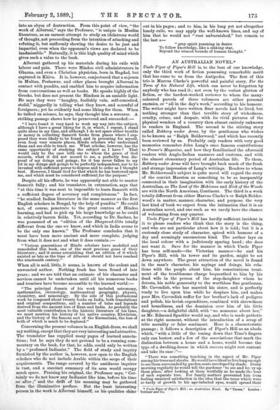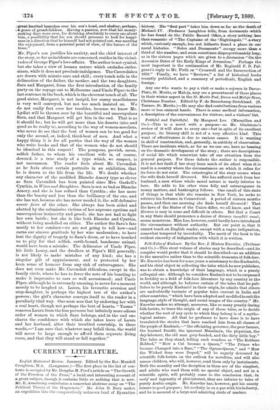AN AUSTRALIAN NOVEL.*
Uncle Piper of Piper's Hill is, to the best of our knowledge, only the third work of fiction possessing remarkable merit that has come to us from the Antipodes. The first of this trio is Marcus Clarke's powerful and painful story, For the Term of his Natural Life, which can never be forgotten by anybody who has read it ; not even by the veriest glutton of fiction, or the hardest-worked reviewer to whom the many- coloured parcels of three volumers are either personal enemies, or "all in the day's work," according to his humour. The writer might have written finer novels had he lived, but nothing stronger than that terrible story of wickedness, cruelty, crime, and despair, with its vivid pictures of the physical wonders of a country then almost entirely unknown to readers in England. The second is the stirring story called Robbery under Arms, by the gentleman who wishes to be known as "Ralph Bolderwood," and which has recently been reviewed by us. Probably only readers with very good memories remember John Lang's once famous contributions to Fraser's Magazine, and how they familiarised the aforesaid readers with Anglo-Indian manners and customs, and with the almost elementary period of Australian life. To them, Robbery under Arms will have brought back much of the fresh and strange impression of Lang's writings. Readers to whom Mr. Bolderwood's subject is quite novel will regard the story of the convict Marston as something to be as inseparably connected in their imagination with the early history of the Australian, as The Last of the Mohicans and Nick of the Woods are with the North American, Continent. The third is a work totally different from either Marcus Clarke's or Ralph Bolder- wood's in matter, manner, character, and purpose, the very last kind of book we expect from the intimation that it is an Australian novel, and one such as we rarely have the chance of welcoming from any quarter.
Uncle Piper of Piper's Hill has hardly sufficient incident in it to please readers who think that the story is the thing, and who are not particular about how it is told ; but it is a curiously close study of character, spiced with humour of a dry and seemingly unconscious kind. The author lays on the local colour with a judiciously sparing hand ; she does not want it. Save for the manner in which Uncle Piper has been self-made—the Victorian manner—he and his Piper's Hill, with its tower and its garden, might be set down anywhere. The great attraction of the novel is found in the man's character, his sayings and doings, his rela- tions with the people about him, his conscientious treat- ment of the troublesome charge bequeathed to him by his dead wife in the person of the step-daughter whom he detests, his noble generosity to the worthless fine gentleman, Mr. Cavendish, who has married his sister, and is perfectly ready to live upon him while he despises him, and makes poor Mrs. Cavendish suffer for her brother's lack of pedigree and polish, his lavish expenditure, combined with shrewdness and homeliness, and the dominion over him of his little daughter,—a delightful child, with "no nonsense about her," as Mr. Edmund Sparkler would say, and who is made pathetic at the right moment, without the introduction of a scrap of
trite morality or false sentiment. Here is a characteristic passage ; it follows a description of Piper's Hill as an abode
which, "with a little of the toning down that Time's fingers only can bestow, and a few of the associations that mark the distinction between a house and a home, would become the type of a dwelling-house in which success might rest content and take its ease
:"- "There was something touching in the aspect of Mr. Piper among his trees and shrubs. He would have liked to live long enough to see them surrounded by garden-seats enveloped by shade. Every morning regularly he would tell the gardener to see and hulry up them pines,' after looking at them wistfully as he made the tear of each separate tree. For family matters prevented him from feeling unmixed satisfaction in the idea that the trees which were so tardy of growth to his age-infected eyes, would spread their • Uncle Piper of Piper's Hill : an Australian Novel. By "Tuna." London : Trabner and Co. . great.knotted branches over his son's head, .and shelter; perhaps, a posse of grandchildren. . Having apassioa, now.that his money- making days were over, for dictating absolutely to every one about him, a possibility that his son should presume to look for happi- ness in a direction that he himself had not pointed out, was marring the enjoyment, from a paternal point of view, of the future of the trees."
Mr. Piper's son justifies his anxiety, and the chief interest of the story, so far as incidents are concerned, resides in the vicissi- tudes of George Piper's love-affairs. The author is not cynical, but she takes a view of human nature which excludes enthu- siasm, while it does not preclude indulgence. The Caven dishes are drawn with minute care and skill ; every touch tells in the delineation of the father, the mother, and the two daughters, -Sara and Margaret, from the first introduction of the family party on the voyage out to Melbourne (and Uncle Piper) to the last sentence in the book, which is the cleverest touch of all. The good sister, Margaret, is- not insipid, her sunny unselfishness
is very well conveyed, but not too much insisted on. We do not really fret over her troubles, because we know Mr. Lydiat will be thrown over by the beautiful and unscrupulous -Sara, and that Margaret will get him in the end. That is as
it should be ; but he will get more than his deserts (nice and good as he really is), according to the way of women-novelists, who never do see that the best of women can be too good for only the second, or, indeed, third-best of men. And what a happy thing it is for all parties that the way of the women who write books and that of the women who do not should be identical in this respect ! The pompous, peevish, mean, selfish father, to whom his excellent wife is, of course, devoted, is a true study of a type which, we suspect, is not uncommon. The reader feels about Mr. Cavendish as he feels about certain portraits in an exhibition, that he is drawn to the life from the life. We doubt whether
any character of the modified Blanche Amory type so clever as Sara Cavendish has been painted since Mrs. Gaskell's Cynthia, in Wives and Daughters. Sara is not so bad as Blanche _Amory, and she is less refined than Cynthia; she has more than the beauty and less than the brilliancy of the one, and . she has not, because she has never needed it, the self-defensive savoir faire of the other. She always has been aided and
abetted by the submissive victims of hensupreine egotism and unscrupulous insincerity and greed; she has not had to fight her own battle ; but she is like both Blanche and Cynthia, without being modelled on either. The author fits-Sara's fate neatly to her conduct—we are not going to tell how—and earns our sincere gratitude by her wise moderation ; to have lent the dignity of tragedy to Sara's doom, or to have touched us to pity for that selfish, earth-bound, handsome animal, would have been a mistake. The delineator of Uncle Piper, his little Louey, and the dwellers at Piper's Hill generally, is not likely to make mistakes of any kind ; she has a singular gift of appraisement, and is protected by her keen sense of humour from any risk of extravagance. She does not even make Mr. Caven.dish ridiculous, except in the family circle, where he has to force the note of his boasting to make it impressive to ears so well accustomed; and Uncle Piper, although he is extremely amusing, is never for a moment merely to be laughed at. Laura, his favourite aversion and step-daughter, is perhaps the highest test of the author's powers ; the girl's character conveys itself to the reader in a peculiarly vital way. One soon sees that by endowing her with a real heart, though not perhaps the best of hearts, " Tasma " removes Laura from the less perverse but infinitely more odious order of women to which Sara belongs, and in the end one shares the confidence with which she takes leave of Laura and her husband, after their troubled courtship, in these
words,—" I am sure that, whatever may befall them, the world
will never be large enough to afford them separate living room, and that they will stand or fall together."



































 Previous page
Previous page